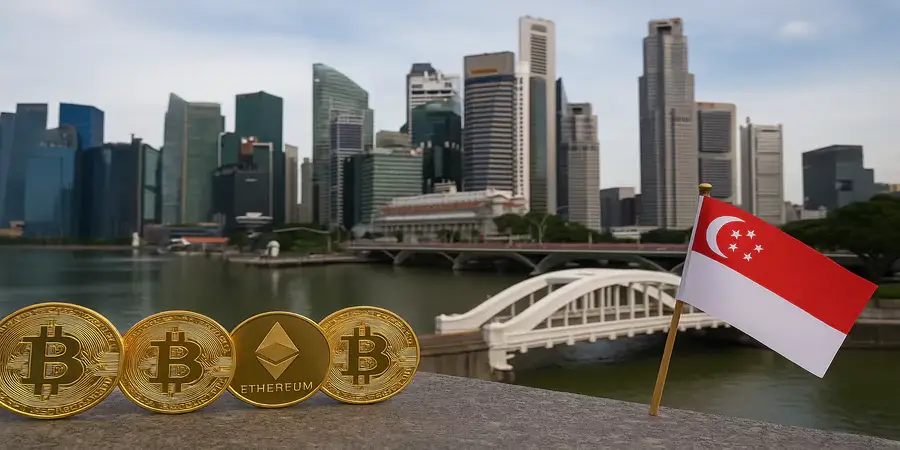Singapore is one of the most economically developed countries in the APAC region. Not only does it provide its citizens with a protective governing layer of financial regulations, but it also has a blossoming crypto scene that has captivated many citizens to enter the space.
If you’re looking to jump into this trend as a Singaporean, you’ll be pleased to know that there’s a pretty solid and secure digital asset ecosystem within local soil. This landscape empowers locals to conduct a wide range of domestic and international crypto activities at their own will, granted that it’s within legal bounds.
That said, if you’re new to the scene, then you may be wondering what exactly crypto regulations cover in this city-state. If that thought fills your mind, then you’re in the right place. We’ll cover what you need to know before you start trading cryptocurrencies in Singapore.
Let’s jump right into it!
The Key Crypto Regulatory Bodies in Singapore
Singapore may be small geographically, but in the finance world, it’s globally recognised as a central hub with mature and stringent regulations surrounding cryptocurrency.
Multiple government bodies within the city state play key roles in upholding the safety and security of holding, trading, and investing in cryptocurrency for its citizens. These authoritative bodies perform several different functions in regulating the use of this digital token.
Let’s explore these authoritative bodies and what they do in greater detail.
1) Monetary Authority of Singapore (MAS)
The Monetary Authority of Singapore is the central governing authority of anything related to finance and financial assets in the country. Their authority encapsulates not just fiat currency, but also cryptocurrencies and digital assets that operate under a blockchain network.
Some of the notable functions of the MAS include setting monetary policy and issuing currency.
That said, in the crypto space, this regulatory body is responsible for regulating and licensing crypto exchange platforms like Independent Reserve Singapore, as well as digital payment token (DPT) service providers.
2) Inland Revenue Authority of Singapore (IRAS)
The Inland Revenue Authority of Singapore (IRAS) handles all taxation matters, including those related to cryptocurrency.
Crypto businesses, and all businesses in Singapore in general, must ensure that they declare and file accurate tax reports and submit them on time, which is at the end of each financial year.
While Singapore generally does not impose a capital gains tax, profits from frequent or business-like crypto trading are taxed as income. IRAS provides clear guidelines on any trading activities that need to be taxed.
If you’re having difficulty complying with crypto regulations, then consult with a tax professional to help you fill out your Form B1 or Form M.
3) Accounting and Corporate Regulatory Authority (ACRA)
This regulatory authority is responsible for overseeing the registration and compliance of crypto businesses in Singapore.
It sees to it that blockchain startups and businesses dealing with crypto trading are following lawful practices within the city state when it comes to corporate governance.
This authority also provides guidelines on accounting and corporate regulatory practices that companies should follow. If the company or exchange you’re dealing with has not been licensed by ACRA, then that’s considered a red flag, and you should reconsider your decision to deal with them.
Crypto Regulations to Know in Singapore
1) The PS Act 2021
The most important guideline to follow and notice before you start trading crypto in Singapore is the Payment Services (PS) Act of 2021.
This act, which was pushed by the Parliament of Singapore in 2021, provides a framework for the regulation of payment systems and exchange platforms in Singapore. This includes crypto exchange platforms and companies that recognise crypto as a form of currency.
Specifically, this act expanded on the previous PS Act 2019, which expanded the definition of the term “digital payment token” (DPT) to include other activities related to DPT. Crypto falls under this category. The previous act was crucial for spearheading the licensure of exchange platforms in the country, which helped legitimise it as a form of currency.
This act also requires licensees to protect customer data and safeguard assets in a more standardised way. Moreover, it was integral for the enforcement of strict anti-money laundering rules and the mandating of KYC procedures to further secure the crypto landscape amidst its inherent risks.
2) Know-Your-Customer (KYC)
In Singapore, KYC is strictly enforced under the Payment Services Act to combat money laundering, terrorism financing, and fraudulent activity.
This act requires users to present valid identification to a crypto exchange platform, such as a government-issued ID or a passport, before they can use its services. Some platforms may even require users to submit a face picture or conduct a video call.
This practice reduces the sense of anonymity that crypto is famous for, but as a tradeoff, it improves trust and security for anyone who plans to use crypto exchange platforms in Singapore, which is arguably a big advantage.
3) Crypto Travel Rule Compliance
The Financial Action Task Force (FATF) is a global standard that’s aimed at fighting against criminal acts such as money laundering. Singapore implements these guidelines locally for the safety and security of its citizens.
In FATF Recommendation 16, the rule requires crypto exchanges and wallet providers to collect and share customer information if a transaction exceeds SGD 1,500. This is to ensure secure transactions among all people while still ensuring that criminal activity can be tracked and acted upon before any incident.
4) Guidelines on Consumer Protection
The Monetary Authority of Singapore (MAS) have revised its guidelines last September 2024 to improve consumer protection measures.
For instance, retail customers must undergo risk awareness assessments to ensure that they’re familiar with the risks associated with crypto trading and its related services.
Moreover, additional management controls are enforced to protect these digital assets in the hands of customers. For instance, DPT providers are forbidden to entice customers to carry out any transactions under these guidelines.
These guidelines have also imposed strict rules on licensees to prevent conflicts of interest from arising, ensuring the integrity of the business and nipping the chance of fraudulent activity from taking place.
5) Taxation of Crypto in Singapore
Another important guideline to know is the taxation rules on crypto in Singapore. Unlike other countries, Singapore doesn’t impose capital gains tax on cryptocurrency. This means that long-term crypto holdings don’t get taxed even if they’ve turned a profit.
That said, income is considered taxable if received in cryptocurrency. It will be categorised as taxable income depending on the frequency of transactions and the intention behind the trading activity.
Another neat fact: products bought through crypto aren’t subject to GST in Singapore, unlike fiat currency. Taxpayers must file crypto-related taxes together with their other monetary obligations between March 1 and April 18, 2025. This compliance is crucial for Singaporean citizens since crypto is recognised, in some aspects, as a taxable digital asset.














